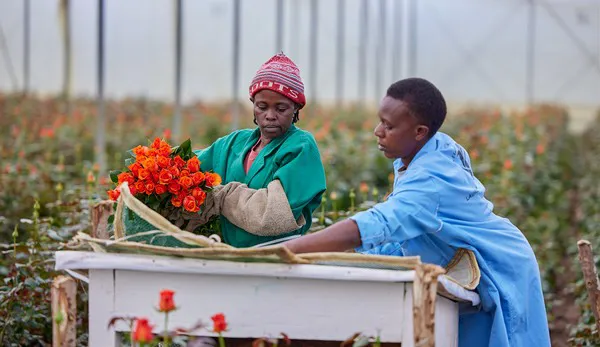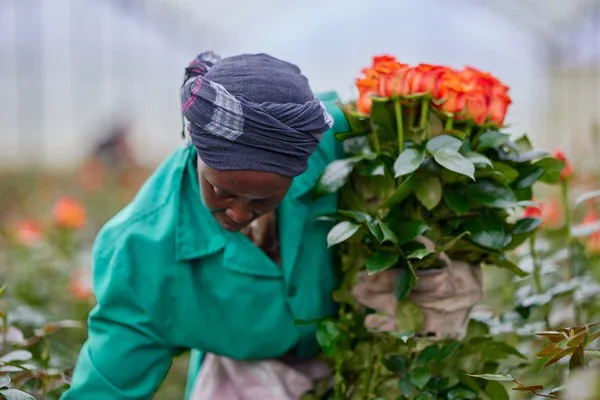Working towards a future where every woman exercises their rights. That is the aim of Win-Win Strategies, a brand of Dutch-based women’s fund Women Win. In 2020, they started several projects in Kenya in the floriculture and tea industry as part of their Building Bridges for Women’s Economic Empowerment Program, funded by the Dutch Ministry of Foreign Affairs. The program focuses on the economic resilience and empowerment of women working in international supply chains. By building bridges between Kenyan women's rights organizations who have the experience and expertise and businesses who can benefit from implementing suggested activities, Win-Win Strategies aims to create a win-win situation for both parties and the women working in the supply chain. This is explained by Nada van Schouwenburg, Programmes Specialist at Win-Win Strategies.

Drawing the Line
One of the initiatives that is coming from the Building Bridges program is the Drawing the Line methodology, which brings women’s voices to the forefront by identifying key issues that women face in the workplace at production facilities. “It is a methodology in which we place women at the center of the conversation in a fun and interactive way. It is a tool consisting of a set of approximately 20 cards with statements on one side such as, ‘I have safe transport home”, or,” I know my rights” with images on the other side depicting the statements. In groups, led by a women's rights expert, these cards will be discussed one by one. The women are asked to share their thoughts and determine how important these different issues are to them in their day-to-day lives and whether this is something they are missing in the workplace at the moment. In the end, the group will have selected a set of cards with issues that are important to them but is something they currently don’t have in their workplace. Eventually, the women’s rights expert will develop a report with the results of the session to be discussed in detail with the management of the production facility and work to address some of these raised issues. "
Click here for more information on the Drawing the Line project (PDF).
Last year, WWS collaborated with the Kenya Flower Council, which asked some of its members to cooperate in the program. They had the opportunity to visit five different farms and set up the project. After many successful sessions, they are now working on the follow-up projects for addressing the issues raised whilst a growing group of farms in the industry is showing interest in organizing a Drawing the Line session at their facility.

How to let Women-owned flower farms thrive
The flower sector in Kenya provides direct employment opportunities to about 150,000 people, of whom the majority are women. “Women’s economic empowerment is one of our goals and we believe that women-owned flower farms play an important role to achieve this goal, as they challenge the man-dominated leadership in the sector, as well as improving the position and working conditions of women employees in their businesses. There are so many women working in the industry, so why aren’t there more women-owned flower farms (WOFF)? What are the challenges and what is needed to improve their position in the floriculture sector? To find out, a study has been carried out by WWS, FIDA-Kenya, and Workers’ Rights Watch. The study found that the women entrepreneurs in the industry have a couple of unique challenges related to old-fashioned gender norms, on top of challenges common to small and starting businesses. The research reveals that these women struggle with the high costs of participating in certification schemes, land ownership, limited access to markets and credit facilities, balancing business with unpaid care work, and lack of access to information and training opportunities. The research team found that there is a clear need for greater support, as well as creating platforms for women entrepreneurs in the floriculture sector to meet, connect, and gain greater access to a wider network of buyers in the sector.
The main recommendations from the research are geared towards four key stakeholders/actors, namely buyers (including auctions, supermarkets, and retailers), certification bodies, governments and embassies, and civil society organizations/initiatives (including multi-stakeholder initiatives). In conclusion, these recommendations call on all actors to work in solidarity to ensure that women-owned flower farms are supported with training and networking opportunities to access the market. That way these women-owned businesses can blossom in Kenya’s floriculture sector, which contributes to broader gender equality in the sector and beyond.
Click here to read the complete research (PDF).
Gender-Responsive Due Diligence Platform
In 2021 Win-Win Strategies launched the Gender-Responsive Due Diligence Platform. With the upcoming legislation for human rights due diligence at the EU and Dutch national level, businesses with international supply chains will soon have the responsibility to ensure that human rights are protected throughout the production process of the goods that they trade. This means that for example a retailer here in the Netherlands, will have to work closely together with its producers overseas to roll out a due diligence process to ensure fair and safe working conditions. The Human Rights Due Diligence is the process to identify adverse impacts relating to human rights, labor rights, and the environment with the aim of ending, preventing, or mitigating those risks. With the Gender-Responsive Due Diligence platform, WWS guides businesses step-by-step on how to apply a gender lens to the business’ due diligence process and ensure they work towards gender equality.
The Platform also offers practical resources, real-life case studies, and advice to help businesses implement each step of the due diligence process in a gender-responsive manner. On top of offering all this information on the platform, WWS also support businesses through GRDD workshops for CSR and sustainability professionals who are responsible for designing and implementing due diligence.
Click here to go to the platform.
For more information: Win-Win Strategies
Win-Win Strategies
Nada van Schouwenburg
Email: [email protected]
www.womenwin.org/win-win-strategies
